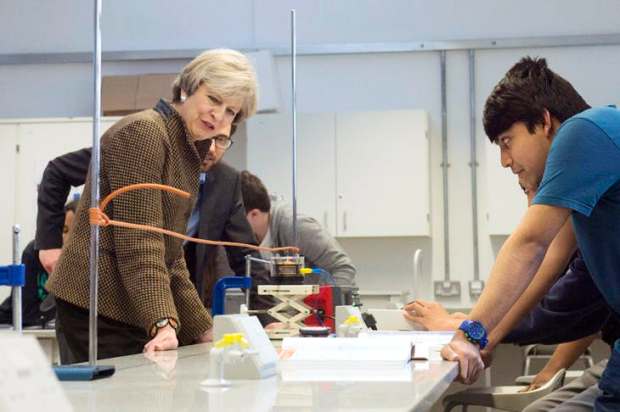‘It is highly unlikely the Prime Minister has read the book,’ my father harrumphed, commenting on the appropriation of the word ‘meritocracy’, which he invented to describe a dystopian society of the future in The Rise of the Meritocracy. That comment appeared in a 2001 article for the Guardian and the Prime Minister in question was Tony Blair, but I expect my late father would have been equally unhappy about Theresa May’s misuse of it in her education speech last week.
In fact, he probably would have been even more cross because the book, which was published in 1958, was a thinly veiled attack on grammar schools. Like his close friend and Labour party colleague Tony Crosland, my father was a lifelong opponent of selective education, mainly because he saw it as tool for perpetuating inequality. In a society where the brightest children are separated from their peers at the age of 11 and groomed for entry into the elite, the monopolisation of power and wealth by a tiny minority has the air of legitimacy. Perhaps not wholly legitimate, but certainly more likely to command popular consent than an aristocratic society. Not only that, but grammar schools also deprived the working class of potential leaders, plucking the most able children from their parents’ arms and turning them into Tories.
As a conservative myself, I don’t share my father’s hostility to meritocracy. It seems a little odd that he should have invented a future dystopia to advance the cause of socialism when there was an actual socialist dystopia staring him in the face in the form of Stalin’s Russia. To be fair, he and Tony Crosland weren’t apologists for the Soviet Union and were anxious not to jeopardise the institutions of parliamentary democracy in the course of building their socialist paradise. Indeed, Crosland came up with a blueprint for how this might be done in The Future of Socialism, which he published in 1956. But if such naivety was excusable in the middle of the last century, it’s less so today, when we have many more failed socialist experiments to learn from. It now looks as if Friedrich Hayek and others were right and that end-state equality can only be achieved at a terrible human cost, including the suppression of free speech, widespread starvation, the imprisonment of a significant percentage of the population and, in extreme cases, state-organised mass murder. If selective education really does act as a bulwark against this new Jerusalem, as my father believed, then that’s a reason to support it.
However, he also identified another problem with meritocracy — one that’s harder to dismiss. That’s the tendency within meritocracies for the cognitive elite to become a self-perpetuating oligarchy. This isn’t a criticism you’ll often hear of grammar schools, because it involves accepting that intelligence, or lack of intelligence, has a genetic basis and, as such, is at least partly passed on from parents to their children. That’s a live rail in the education debate, because once you accept it then various unpopular conclusions follow. For one thing, it means that a more meritocratic education policy won’t necessarily lead to greater social mobility. Perhaps in the past, when intelligence was more equally distributed between classes, it would have done. But in today’s Britain, where IQ is the single greatest predictor of socioeconomic status, the children of the better off are more likely to pass the 11-plus, and that would remain true — might even become more true — if you could design a tutor-proof test.
Admittedly, if you compare children’s IQ to that of their parents, there’s a reversion to the norm, but the decline isn’t steep enough to offset the built-in advantage that children of high-IQ parents have. It’s also true that people of below-average intelligence can have bright children, but, again, it doesn’t happen often enough to solve the problem of social ossification.
The unwelcome truth is that the underlying rate of social mobility in meritocratic societies is bound to be quite low — probably a big part of the reason it’s so low in contemporary Britain. Not that the UK is wholly meritocratic, but it’s meritocratic enough that any expansion of grammar schools would probably mean less social mobility rather than more.
In The Rise of the Meritocracy, the absence of opportunities for the vast majority to better themselves leads to a bloody revolution in 2033. We’re some way off that, but it’s still a big problem that successive governments have failed to solve. I applaud Theresa May for recognising it, but her solution may not work.
Got something to add? Join the discussion and comment below.
Get 10 issues for just $10
Subscribe to The Spectator Australia today for the next 10 magazine issues, plus full online access, for just $10.














Comments
Don't miss out
Join the conversation with other Spectator Australia readers. Subscribe to leave a comment.
SUBSCRIBEAlready a subscriber? Log in